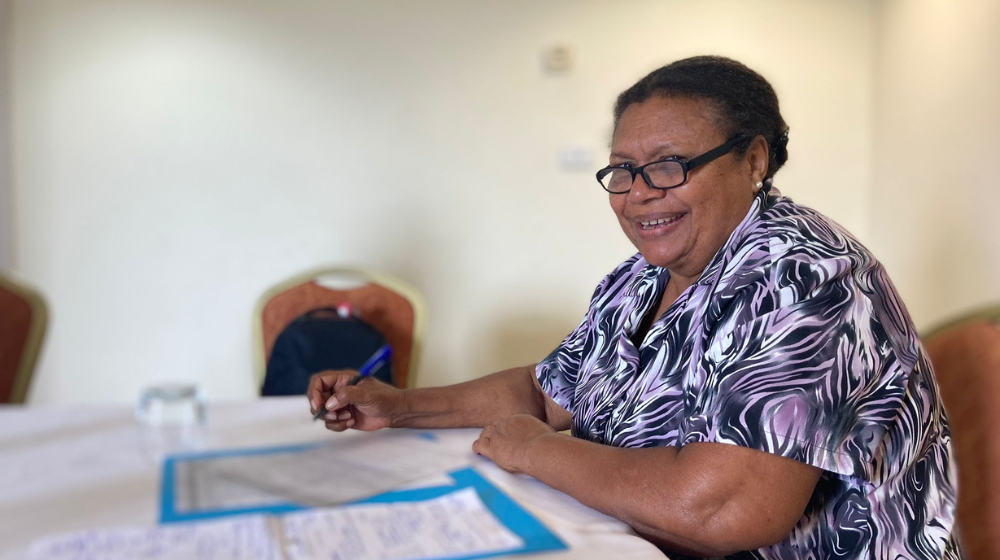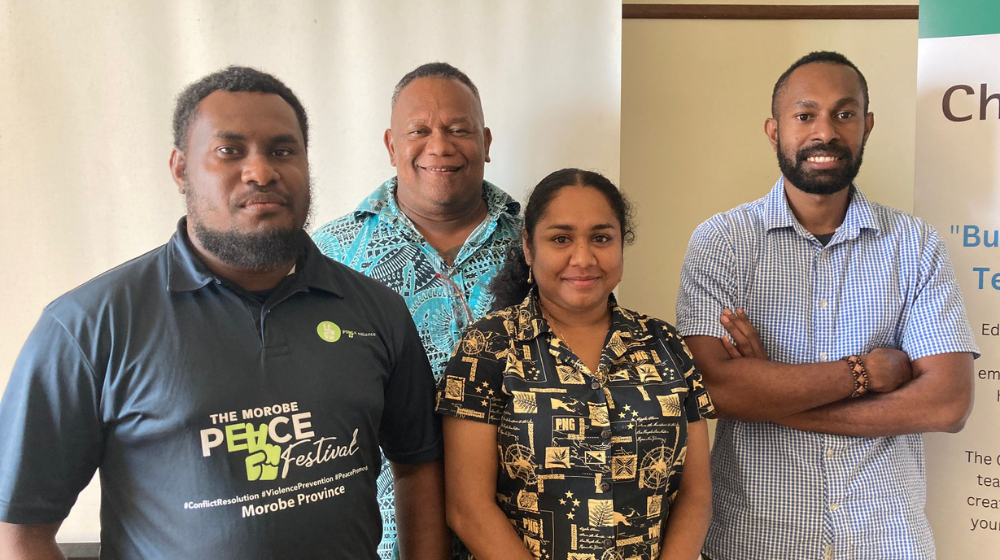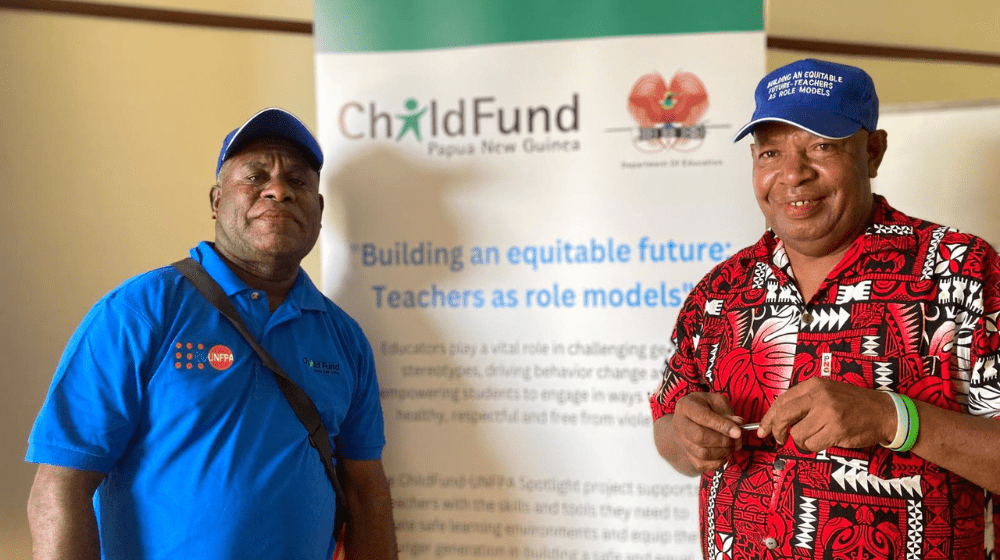Four teacher’s colleges in Papua New Guinea will begin training for prospective teachers on a revised comprehensive sexuality education curriculum in September and October this year.
The new curriculum, developed by the National Department of Education in partnership with ChildFund PNG and with funding support from UNFPA and the European Union through the Spotlight Initiative to end violence against women girls, teaches students about healthy relationships and seeks to address education gaps in reproductive health.
Gaps in health education leaving young people vulnerable
According to data from the National Statistical Office, 22% of 19-year-old girls have at least one child. 6% have at least two. The HIV prevalence rate in Papua New Guinea is 1%. A lack of knowledge about safe sex is leaving children, especially girls, vulnerable to unintended pregnancies and STIs.
Matilda August, the Head of School for professional development at Gaulim Teachers College in East New Britain, shared a story of a young girl from her area.
“She was an older girl and she became pregnant and was sent back to her home,” said Matilda. “My husband asked me ‘Didn’t she know if she had sex she would get pregnant?’”
“But if we don’t teach our children, they won’t know.”
“This is the reality,” agreed Remsy Ossy, the professional development coordinator at Madang Teacher’s College. “We need to ensure that this content gets taught.”
Coordinating the teacher training is ChildFund Papua New Guinea. Project Officer Mcleen Pikacha emphasises that teachers must understand the importance of this curriculum in order for them accept the responsibility of teaching this content.
“You can hear, in speaking with these educators, that they recognize the importance of addressing these social issues we have in the country.”
The curriculum is not just about physical health. The CSE curriculum teaches children about healthy, respectful relationships. As an estimated two in three women in Papua New Guinea have experienced physical or sexual violence, bringing this curriculum into schools nationwide is one strategy to change the narrative on gender-based violence.

Teaching teachers
The successful roll-out of this curriculum relies on teachers being willing and able to teach the content, which is oftentimes considered sensitive and for which teachers themselves may have gaps in their knowledge.
“We’re bringing all the heads of the schools together,” said Mcleen. “The idea is that we bring these leaders together to teach them the importance of CSE and that we - ChildFund, UNFPA, NDoE, and EU - have come together to support this.”
“After this, we go to the schools for a week to train the lecturers, who in turn train those students who are soon graduating and will enter the profession. These lecturers are qualified people, but there’s no harm in gaining more skills and more of this knowledge and some resources to enhance what they have been doing so far.”
Remsy Ossy also drew attention to the need for skills and resources, in addition to the knowledge itself.
“In the pre-service colleges, we have the students who are graduating and they will be going out to the community as teachers,” he said. “It’s not just about what they know, about about the skills they need to teach. How should we package this for them? What is the best approach? This is the benefit of engaging with our staff at the colleges.”
“And what will happen after next year?” asks Mcleen. “They will try to merge the topics and skills into the courses they are already taking.”
Ensuring sustainable change
ChildFund’s approach to rolling out a sustainable comprehensive sexuality education curriculum is to ensure the training colleges take ownership of training prospective teachers in the skills and resources they need to teach this content correctly and effectively. The organisation has already provided this training to some institutions, including Don Bosco.
“When we trained teachers at Don Bosco, they had their own roll-out and they trained 80 students,” said Mcleen. “Sacred Heart are doing their roll-out for teachers in September.”
“So we have trained the lecturers, we have trained 20 selected students, and now they are doing their own roll-outs to train even more prospective teachers. It’s those who have been trained who are now continuing this training.”
“That’s the importance of training lecturers first. When we leave, they take ownership of it and they continue the program.”
That ownership not only puts the onus on teachers colleges to ensure students graduate with the correct knowledge, skills, and confidence, but ensures that lecturers can bring their experience of what works to the implementation of the revived curriculum.
“I was part of a HIV program that was rolled out for schools in Madang a few years back,” reflected Matilda. “Once we had completed the training, we were tasked with going out to implement it. We merged the content into our teaching. It was a sensitive topic but they used dance and movement as part of the teaching strategy.”
“The students really enjoyed it.”

Next steps
This pre-service training is one part of a package of activities to roll-out the comprehensive sexuality education curriculum. UNFPA, with technical support from Family Planning NSW and the National Department of Education, is working with civil society organisations (CSOs) on the development of CSE modules tailored for out-of-school youth. The work of these CSOs will complement the work of teachers colleges to ensure no child is left behind in basic health education.
UNFPA is continuing to support these partners, including ChildFund, to further ensure that all children in Papua New Guinea have access to quality health education.
“I believe that if we can reach all the teacher training institutions in the country, we expect a good outcome in the next five, ten years down the line,” says Mcleen. “The government is on board. It’s in the Vision 2050. It’s in the curriculum. But are we going to teach it? That’s what ChildFund is here to support.”
This program is being implemented by UNFPA Papua New Guinea in partnership with ChildFund and the National Department of Education under the Spotlight Initiative to end violence against women. As one of four UN implementing agencies for the Spotlight Initiative, UNFPA works to address GBV prevention and response, by strengthening education on healthy relationships for young people and working with health providers on improved referral pathways for survivors.


